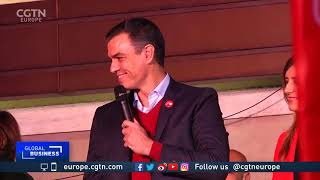02:35

Spain's Socialist party has agreed to form a preliminary coalition with far-left Podemos as it seeks to create a majority in the Spanish parliament. The Socialist party only won 120 seats in the recent 10 November national elections, three seats short of the amount it won in April.
The Socialist party needs 176 parliament seats to have control of the government. While this coalition with Podemos, which is led by Pablo Iglesias Turrión, would give it 35 more seats, it will still have to create a coalition with smaller parties to gain the additional 21 seats required for an outright majority.
If successful, this will be the first coalition government in Spain since the 1970s.

Pablo Iglesias, left, with Pedro Sánchez, who previously said he would not be able to sleep if he formed a coalition government with Podemos (Credit: Reuters/ Sergio Perez)
Pablo Iglesias, left, with Pedro Sánchez, who previously said he would not be able to sleep if he formed a coalition government with Podemos (Credit: Reuters/ Sergio Perez)
Possible coalitions governments
Prime Minister Sánchez may have to form a government with one of the remaining center-right parties in order to form a new Spanish government. One option is the center-right Popular Party (PP), which won 88 seats in this past election.
The PP is one of the Socialists' biggest rivals. Forming a coalition with PP would mean that the Socialists would have to make major political concessions.
The PP wants to lower corporation and income tax in Spain at a national level and attempt to reform freedom of movement within the European Union. A coalition with PP could also potentially increase Vox's influence. Many of Vox's supporters used to be part of the PP.
Vox is Spain's first far-right political party to have gained seats in the Spanish Parliament since Franco's death in 1975 .
They made major political gains in the last election, winning 52 seats. Vox, an anti-Islam and anti-immigrant party, calls themselves an "extreme necessity." They have also coined the phrase "make Spain great again."
Some analyst have claimed that Vox's stance against Catalan independence is one of the reasons they have recently gained popularity in Spain. In addition to their xenophobic politics, Vox wants regional separatist movements banned.
Ciudadanos, another center-right political party in Spain, could have formed a coalition with the Socialists if they had not lost the majority of their seats in this past election. In October, Ciudadanos' leader Albert Rivera said that he was open to a coalition with the Socialists.
However, the loss of 47 seats, from 57 in April to 10 in November, forced Rivera to resign.

Supporters of Socialist Prime Minister Pedro Sánchez, who does not support Catalan independence (Credit: Reuters/Sergio Perez)
Supporters of Socialist Prime Minister Pedro Sánchez, who does not support Catalan independence (Credit: Reuters/Sergio Perez)
Previous attempts at a coalition
This is not the first time that the Socialist Prime Minister Pedro Sánchez has tried to form a coalition government.
He came into power on 1 June 2018 after a no-confidence vote in the previous Prime Minister, Mariano Rajoy, leader of the Popular Party (PP), who was found guilty of illegally receiving funds.
Prime Minister Sánchez then maintained control with support from Podemos, a Basque nationalist party and two Catalan separatist parties. However, this alliance did not last long after the Socialists and Podemos submitted a new national budget that would have raised the Spanish minimum wage by 22 percent.
The budget was rejected after the Catalan separatist parties refused to vote for it because Prime Minister Sánchez opposed a referendum on Catalan independence. Prime Minister Sánchez then triggered an early election on April 28 to strengthen his position in Parliament, which failed.
The Socialists then started talks with Podemos on forming a coalition. The talks collapsed after four months. Recently, Prime Minister Sánchez said that he would not attempt to form a coalition with Podemos if he did not have votes after this most recent election, a position on which he has recently backtracked.
Source(s): AFP
,Reuters